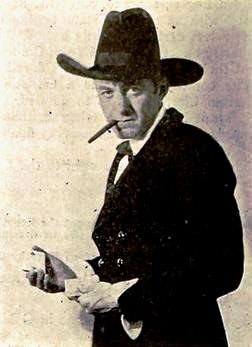Harry Carey (Henry DeWitt Carey)

When a boating accident led to pneumonia, Harry Carey wrote a play, Montana, while recuperating and toured the country performing in it for three years. His play was very successful, but Carey lost it all when his next play was a failure. In 1911, his friend Henry B. Walthall introduced him to director D.W. Griffith, with whom Carey would make many films. Carey’s Broadway credits include But Not Goodbye, Ah, Wilderness, and Heavenly Express. Harry Carey first appeared in a film in 1908. He was contracted to make four films—not only acting but also doing his own stunt work. He is best remembered as one of the first stars of the Western film genre. In 1909, Carey began working for the Biograph Company. In 1911, he was signed by D.W. Griffith. His first film for Griffith was The Sorrowful Shore, a sea story. One of his most popular roles was as the good-hearted outlaw Cheyenne Harry. The Cheyenne Harry franchise spanned two decades, from A Knight of the Range (1916) to Aces Wild (1936). Carey starred in director John Ford’s first feature film, Straight Shooting (1918).
Harry Carey’s rugged frame and craggy features were well suited to westerns and outdoor adventures. When sound films arrived, Carey displayed an assured, gritty baritone voice that suited his rough-hewn screen personality. He was the logical choice for the title role in MGM’s outdoor jungle epic Trader Horn. By this time Carey, already in his fifties, was too mature for most leading roles, and the only starring roles that he was offered were in low-budget westerns and serials. He soon settled into a comfortable career as a solid, memorable character actor; he received an Academy Award nomination for Best Supporting Actor for his role as the President of the Senate in the 1939 film Mr. Smith Goes to Washington. Among his other notable later roles were that of M/Sgt. Robert White, crew chief of the bomber “Mary Ann” in the 1943 Howard Hawks film Air Force and Mr. Melville, the cattle buyer, in Hawks’s Red River. Carey made his Broadway stage debut in 1940, in Heavenly Express with John Garfield. Harry Carey died in 1947 from a combination of lung cancer, emphysema and coronary thrombosis, at the age of 69. He was interred in Woodlawn Cemetery in the family mausoleum in the Bronx, New York.
Born
- January, 16, 1878
- USA
- The Bronx, New York
Died
- September, 21, 1947
- USA
- Brentwood, California
Cause of Death
- lung cancer, emphysema, and coronary thrombosis
Cemetery
- Woodlawn Cemetery
- Bronx, New York
- USA



